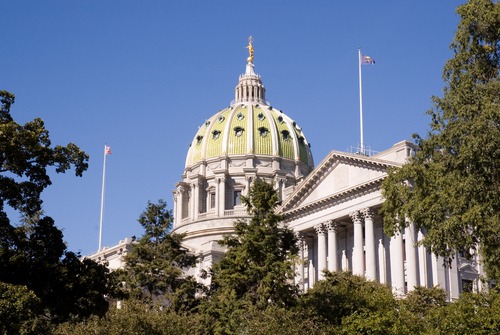
Pennsylvania’s proposed participation in the Regional Greenhouse Gas Initiative (RGGI), a multi-state compact designed to enact a carbon tax on energy producers, would nearly quadruple new electricity costs for consumers, according to newly released state data.
Independent Fiscal Office (IFO) Director Matthew Knittel on Tuesday told state legislators that Pennsylvania energy generators could spend upwards of $781 million annually on emissions credits at the RGGI auctions — nearly four times the amount anticipated by the Wolf administration’s taxpayer-funded analysis used to justify the state’s participation in RGGI in 2020.
During the March 29 public hearing on the economic impacts of RGGI that was held jointly by the state’s Senate Community, Economic and Recreational Development Committee and the Senate Environmental Resources and Energy Committee, the IFO also warned members that “those costs would be pushed through to final customers.”
The $781 million represents a carbon tax on electricity generation that would have a direct impact on electricity rates for residential, commercial and industrial customers, and prove to be particularly harmful to low- and fixed-income households, said Pennsylvania Sen. Gene Yaw (R-23) during the hearing.
“The IFO’s findings confirm my worst fears about the administration’s hasty push to join RGGI,” said Yaw, chairman of the Environmental Resources and Energy Committee. “The cost of this program will cripple our economy at a time when we can least afford it.”
Sen. Yaw and state Sen. John Yudichak (I-14), chairman of the Senate Community, Economic and Recreational Development Committee, led Tuesday’s hours-long hearing, which also included testimony from affected businesses and labor groups, including the Pennsylvania Chamber of Business and Industry; the National Federation of Independent Business; the Pennsylvania Manufacturers’ Association; the Virginia Manufacturers’ Association; the International Brotherhood of Electrical Workers; the International Brotherhood of Boilermakers; and Boilermakers Local 154.
“Thoughtful, independent testimony from a diverse group of experts in government, business and organized labor confirms the many concerns legislators have raised about the administration’s unilateral and unconstitutional decision to push Pennsylvania into the RGGI without legislative action,” said Yudichak, who along with Yaw are leading a contingent of state Senate Republicans fighting Gov. Tom Wolf’s plan to join RGGI.
The IFO, which conducts nonpartisan examinations of state budgetary policy, reviewed the Wolf administration’s RGGI modeling at the request of Yaw and Yudichak, who last month asked IFO to audit the modeling completed by ICF International and used by the state’s Department of Environmental Protection (DEP) to justify RGGI’s supposed economic and environmental benefits.
Knittel specifically testified on the most recent assumptions used by ICF International to model the potential impact on Pennsylvania joining the RGGI, noting that he was unable “to comment on the relative accuracy of projections or the reliability of the models used.”
Among several details provided about the IFO analysis, Knittel said RGGI auction prices are much higher than assumed in the most recent February 2021 modeling. The higher auction proceeds, he said, could have “significant implications for other aspects of the model.” For instance, if costs are pushed forward, then higher prices could impact overall demand and in-state generation.
“Growing evidence from economists and environmental scientists suggest that RGGI will devastate Pennsylvania’s energy industry, dramatically increase energy costs for every consumer and produce no material gains in reducing greenhouse gas emissions,” Yudichak said.
IFO analysis also concluded that emissions reductions between 2008 and 2020 for the 10 RGGI states were comparable to non-participating states — a fact that Yaw said unravels the entire premise for joining the initiative.
“This is disastrous policy built on delusions of grandeur, and we must do everything we can to prevent Pennsylvania from diving headfirst off this proverbial cliff,” he said.
Other testimony appeared to bolster the senators’ concerns about Pennsylvania joining the RGGI.
Carl Marrara, vice president of government affairs for the Pennsylvania Manufacturers’ Association, said that although Pennsylvania is the nation’s No. 1 energy exporter, if RGGI is successfully implemented, the state would face the closure of five coal-fired power plants, facilities he said have just invested billions of dollars in environmental mitigation to be current with every state and federal clean air quality standard.
“With the quadrupling of the RGGI auction price, natural gas power plants, which have contributed to a 20-percent reduction in overall greenhouse gas emissions in our Commonwealth, will be threatened, too,” Marrara testified.
He also pointed out that since Gov. Wolf first proposed RGGI in 2019, not a single natural gas-fired power plant has been proposed for construction in Pennsylvania. “Unfortunately, several have been constructed in that time just across our borders in West Virginia and Ohio,” said Marrara. “What this will do to overall reliability is uncertain, but it cannot be good news. Our days as an energy exporter will surely be over.”
Kevin Sunday, director of government affairs for the Pennsylvania Chamber of Business and Industry, called it extraordinary that Pennsylvania’s power generation sector over the past several decades has maintained a pole position in the energy exports among all states, while also reducing greenhouse gas emissions more than any other state except Ohio.
“Our emissions intensity in valuating on a basis of emissions per unit of power produced has fallen by 35 percent since 2007, although volume of our electricity exports to neighboring states, many of them current RGGI participants, has increased by 40 percent,” Sunday testified. “Pennsylvania has actually reduced its greenhouse gas emissions more than RGGI states combined, and on a proportional basis, more than twice as much.”
Pointing to IFO’s analysis, Melissa Morgan, Pennsylvania assistant state director at the National Federation of Independent Business, said families across the state are likely to face a 30 percent-plus increase in electricity costs, which is only slightly higher than the rates to be incurred by small business owners.
“DEP’s model claimed that the RGGI tax rate would be $3.24 in 2022, not $13.50,” said Morgan. “The DEP projections missed the mark by a multiple of four.”